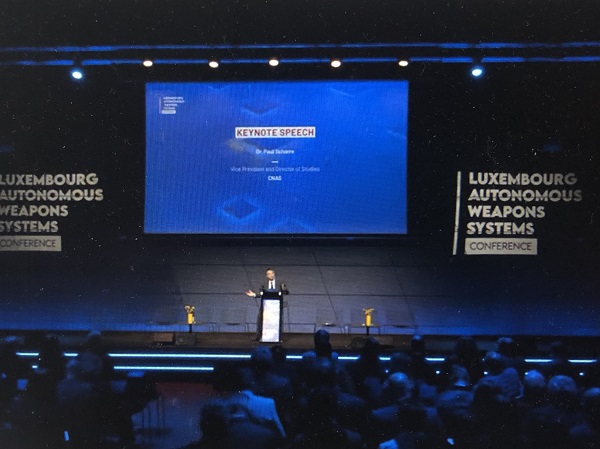 Paul Scharre, vice president and director of studies at the Center for a New American Security;
Credit: Chronicle.lu/Otilia Dragan
Paul Scharre, vice president and director of studies at the Center for a New American Security;
Credit: Chronicle.lu/Otilia Dragan
On Tuesday evening, a two-day international public conference on lethal autonomous weapon systems kicked off in Esch-Belval and via livestream.
On Tuesday 25 and Wednesday 26 April 2023, Luxembourg’s Deputy Prime Minister and Minister of Defence, François Bausch, is hosting the first edition of the Luxembourg Autonomous Weapons Systems (LAWS) conference, held in hybrid format.
This international public conference aims to raise awareness on this topic and provide all stakeholders with a platform to discuss the risks and challenges associated with the use of lethal autonomous weapons systems.
On Tuesday, Minister Bausch delivered a keynote address in which he stressed that “technology will continue to be developed but we need to consider ethical and legal implications of the use and misuse of [autonomous weapons systems].” He also called for the involvement of the Luxembourg population and announced the launch of a public consultation survey on the evening which will be available for one month and which includes questions on autonomous weapons systems.
Paul Scharre, vice president and director of studies at the Center for a New American Security, also delivered a keynote address. He warned about the ethical risks involved in “offloading cognitive tasks to machines,” giving the example of how drones are already able to identify objects and, in one instance, carry out a lethal attack on a Russian tank. What was only imaginary a decade ago became possible, even widely available, but he pointed out that certain decisions of war should best be left to humans, in order to retain a sense of “responsibility” during warfare, to manage escalation and to ensure humans can maintain control, which he noted was also important from a legal standpoint. He also discussed previous weapon bans in history, stressing that “agreements alone don’t help guarantee compliance in war” and that in order to not use certain particularly ruinous weapons, states must realise that their effects would outweigh the military benefits. “The best rules have clear bright lines between what is permitted and what [is] not,” Paul Scharre said, discussing regulations for aerial bombardment in which being told that certain areas could be targeted while urban areas were off-limits did not help reduce the harm caused to civilian zones in the end. He ended his keynote on a hopeful note, saying that he believes we can be successful at restraining the use of new weapons but that “we must come together to manage risks of new technology.”
On Wednesday, national and international experts will discuss governance frameworks, technical challenges, ethical considerations and military use cases of lethal autonomous weapons in various expert panels.
The Luxembourg Government Council (Cabinet) approved the establishment of an interministerial working group on lethal autonomous weapon systems on 22 July 2022. This working group’s responsibility is to define Luxembourg's position on the subject of lethal autonomous weapons, under the coordination of the Directorate of Defence. The working group’s task is that of making proposals concerning the regulation of lethal autonomous weapons at the international level and at the national level (where appropriate). The group is also tasked with making guidelines on ensuring and verifying compliance with the aforementioned regulations.
The discussions and results of the LAWS 2023 are expected to enable the identification of avenues of reflection for the development of a position for Luxembourg on this subject.








